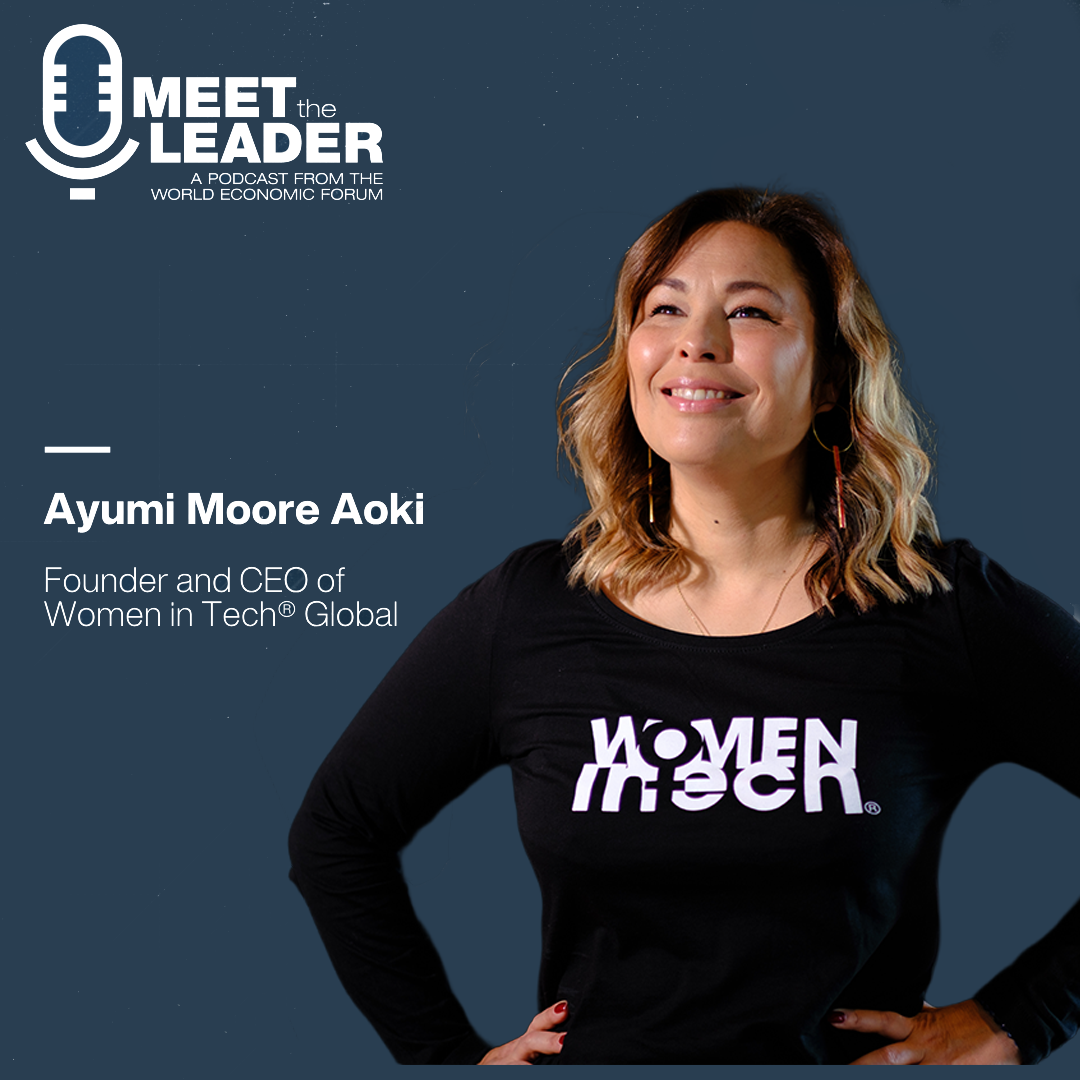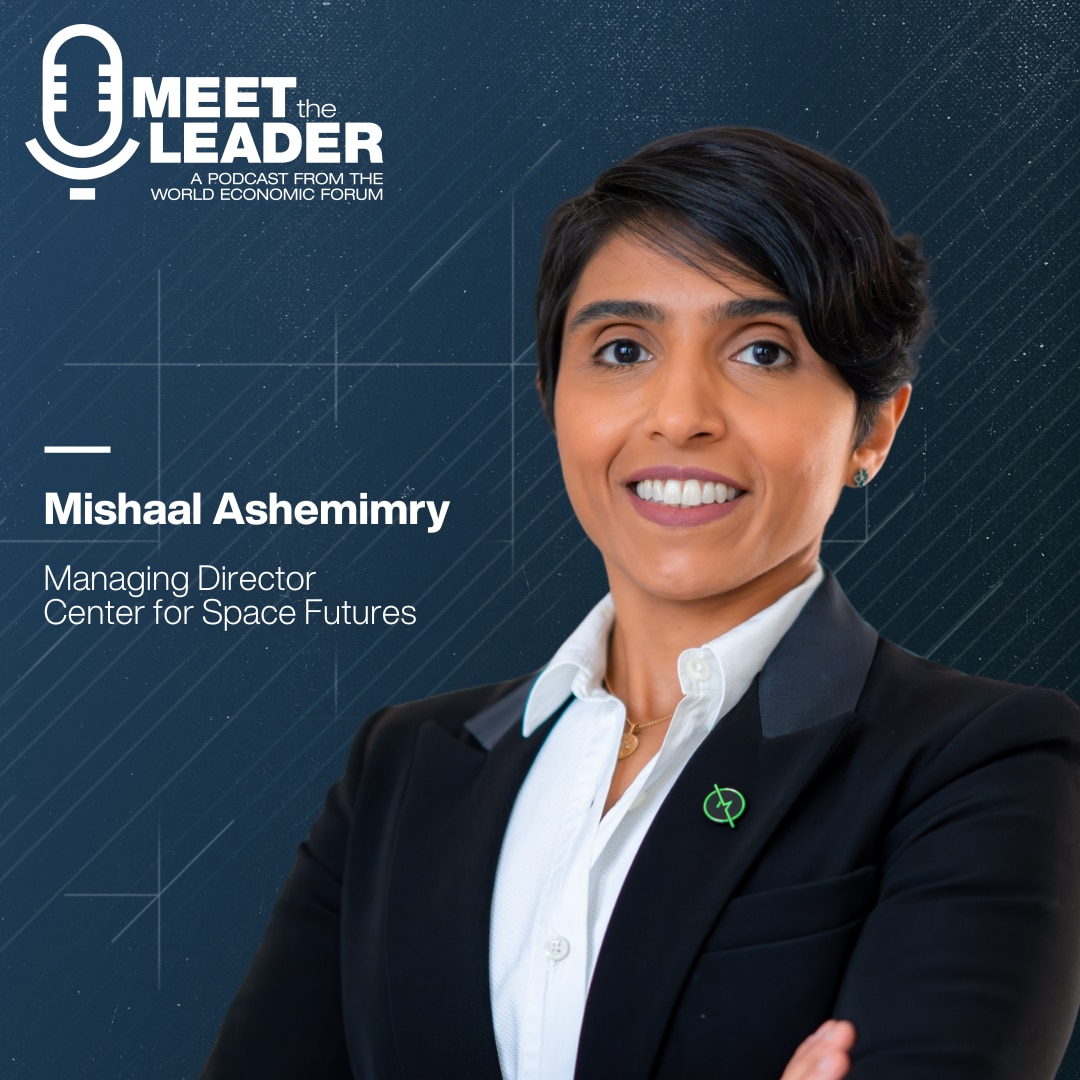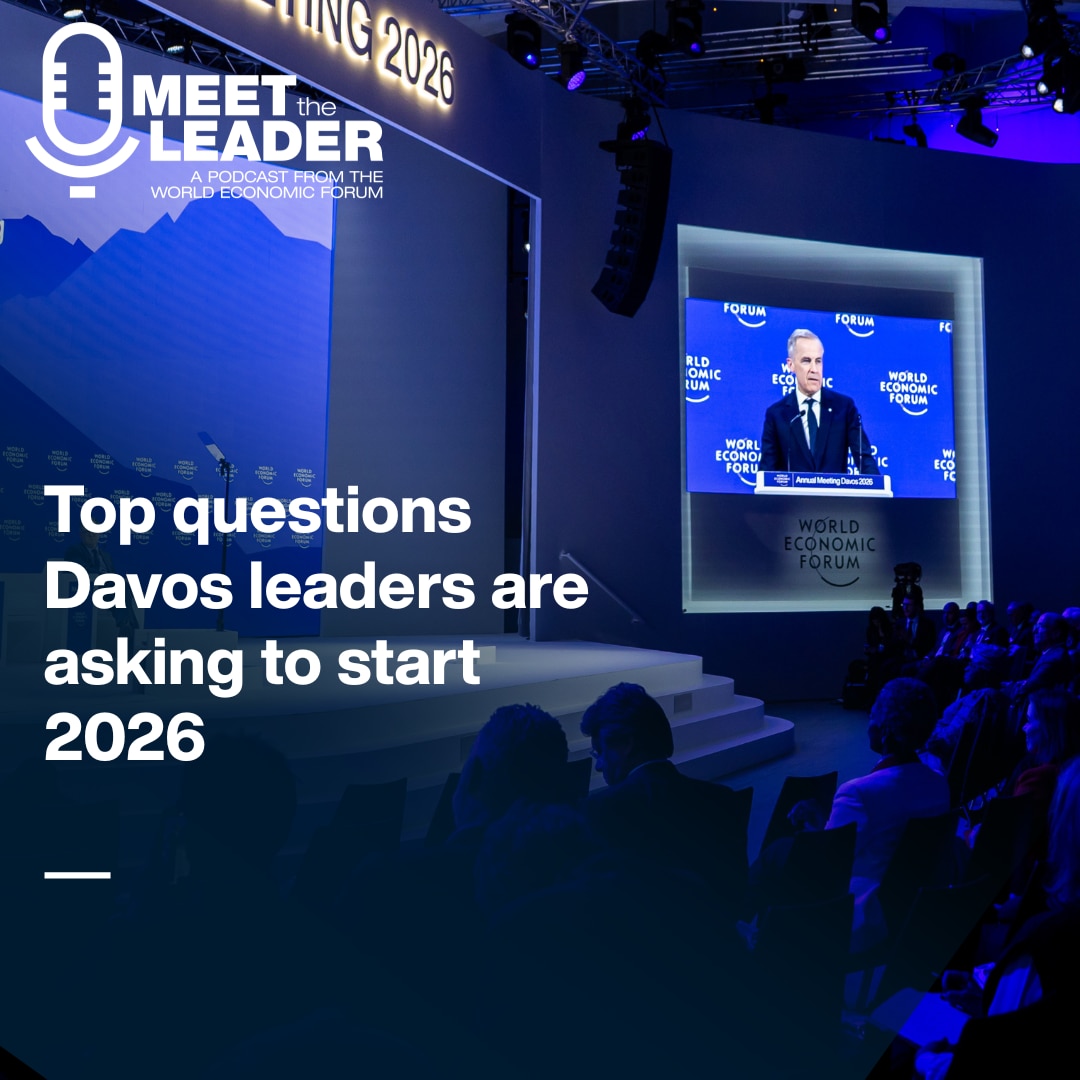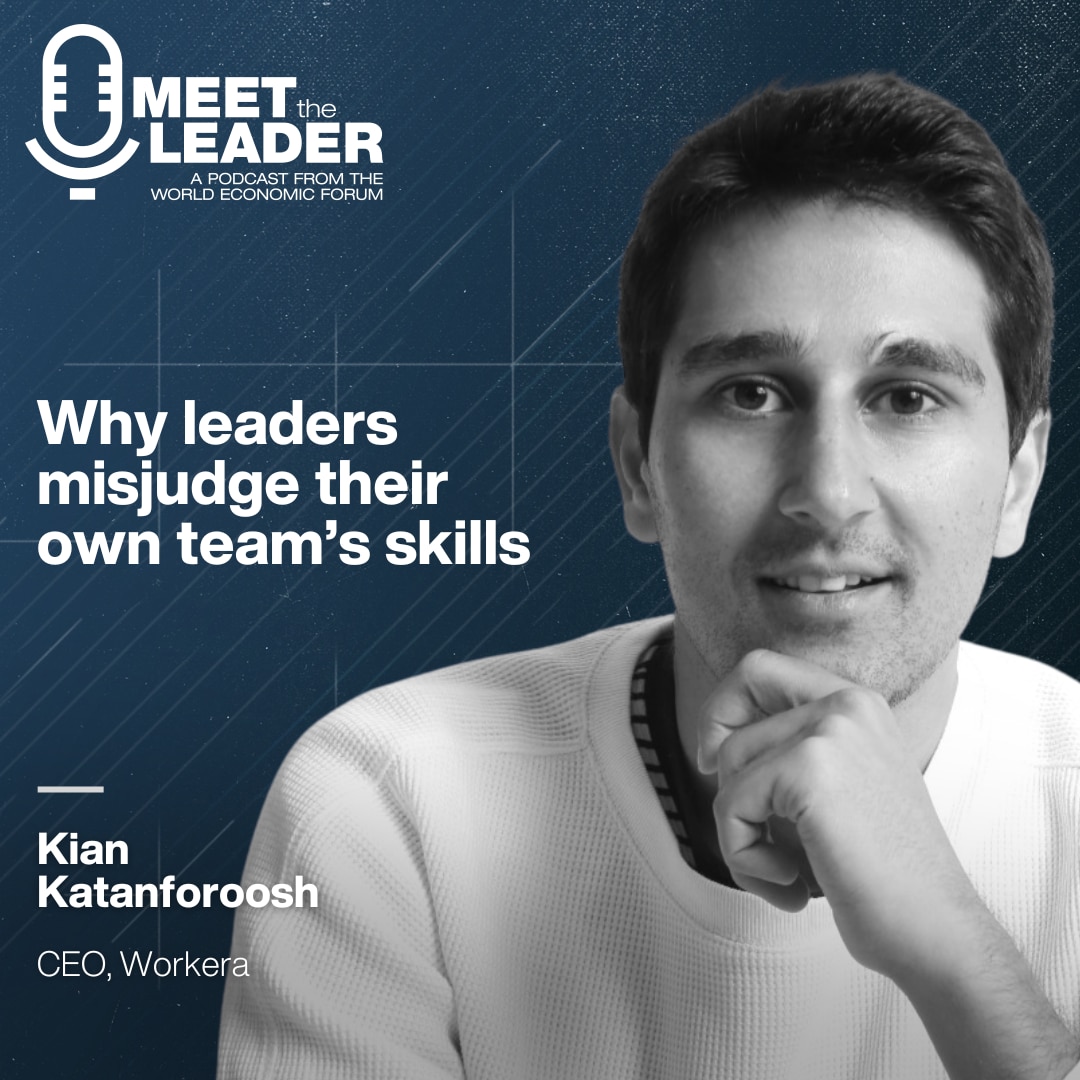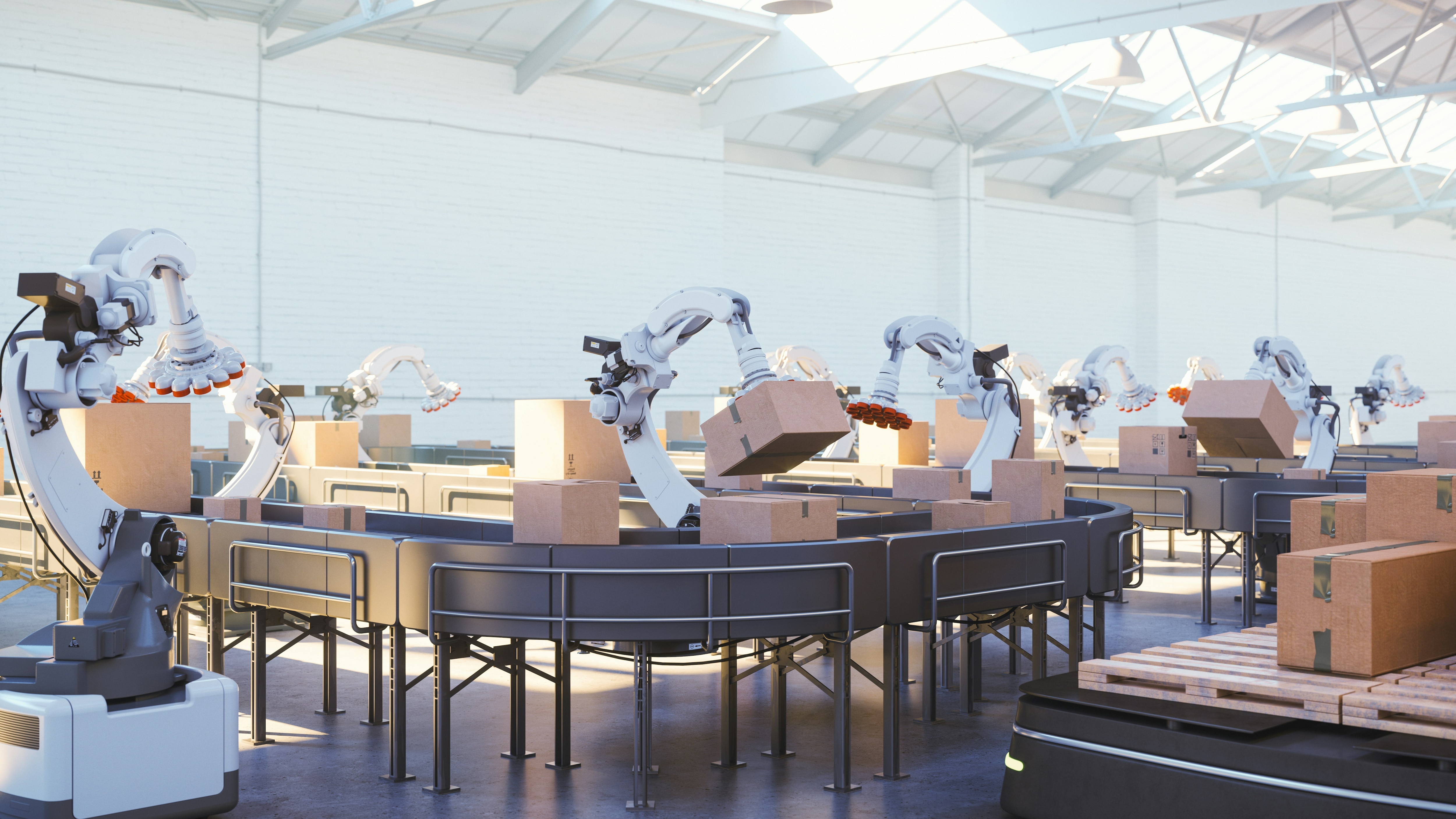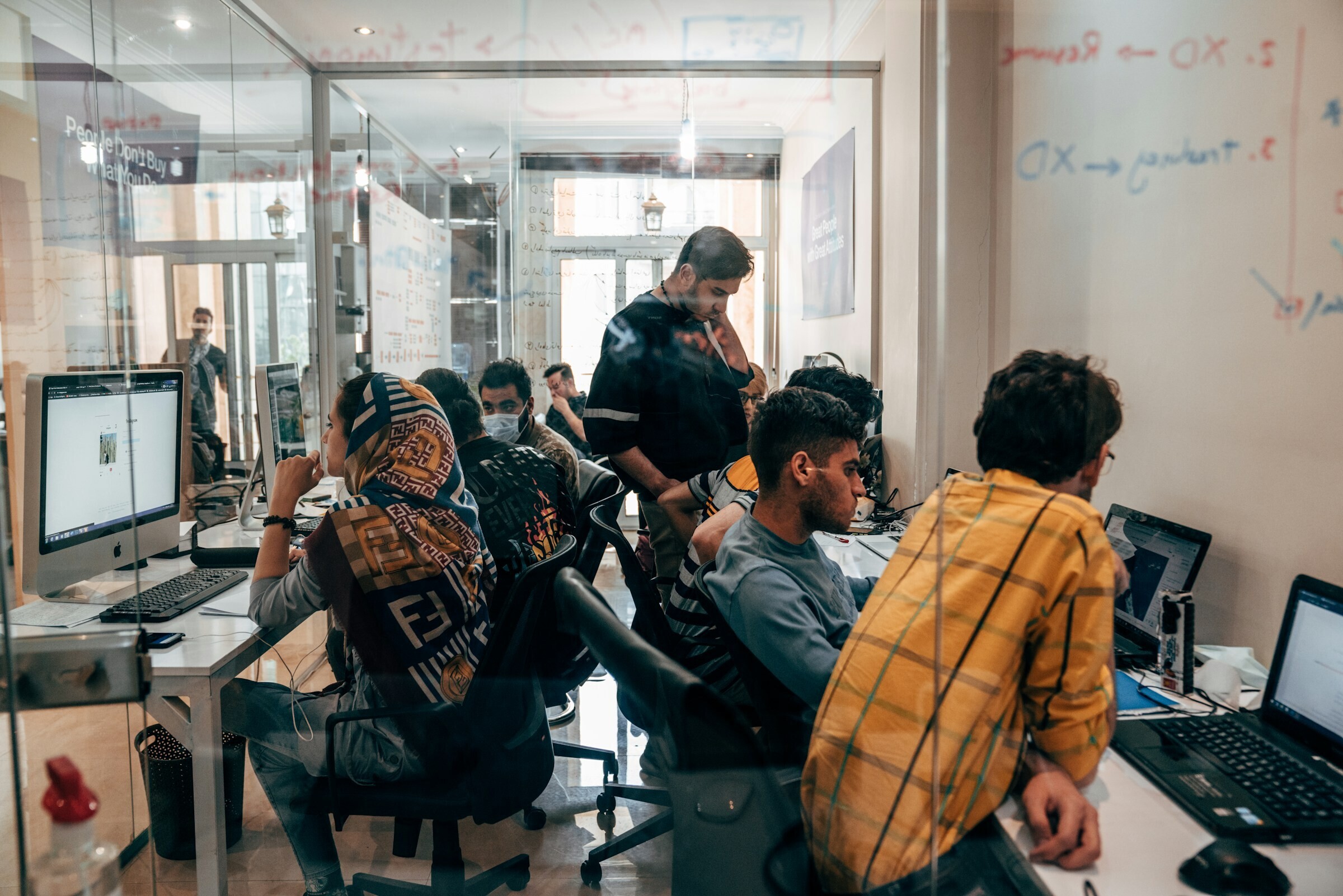10 Leaders from Google, LinkedIn and More on Reskilling for the Future of Work
Podcast transcript
Judith Wiese, Siemens: So this whole notion of I go to school, I do an apprenticeship, maybe I go to uni, and then I'm kind of done, and every now and then I do a little bit of topping up. You know, forget about that.
Linda Lacina, Meet The Leader: Welcome to Meet the Leader, a podcast where top leaders share how they're tackling the world's toughest challenges. In this special compilation episode, we talk skills: how they're changing, and why you are going to need to get serious about them.
Subscribe to Meet the Leader on Apple, Spotify, and wherever you get your favourite podcasts. And please take a moment to rate and review us. I'm Linda Lacina from the World Economic Forum, and this is Meet the Leader.
Nicolas Schmit, European Commission: When you tell somebody you have to be reskilled, not everybody says, "Well, that's fantastic. I, waited just for that." No. You have to convince and you have to show that being reskilled, being upskilled is a better opportunity.
Soon-Joo Gog, SkillsFuture Singapore: The business strategy must be supported by talent and skill strategy.
Linda Lacina, Meet The Leader: The World Economic Forum's Future of Jobs report was released last week, and in it are some compelling statistics, including the fact that 44% of worker skills will be disrupted in the next five years. And during this time, many employers surveyed expect a 23% structural labor market churn as new jobs emerge and existing roles evolve.

These are just some of the big trends my colleagues covered during the World Economic Forum Growth Summit, a conference held in Geneva with top minds exploring the big trends shaping economic growth.
You can follow the jobs report as well as other big research and every big panel through the many articles, videos, podcasts my colleagues have done, breaking down the big themes.
That's all on wef.ch/growthsummit.
But before you do, dig into this special episode of Meet the Leader. I've compiled interviews from a range of leaders conducted at Forum events, including the Annual Meeting and this year's growth summit. They'll remind you to get serious about re-skilling. while sharing actionable advice on how to navigate a time of change and upheaval.
We'll get started with Becky Frankiewicz. She's the Chief Commercial Officer at workforce solutions company Manpower Group. She was one of several leaders who have stressed to our team the need for workers and leaders to shift their focus from jobs and titles to capabilities and skills.
She explained to my colleague Gayle Markovitz at January's Annual Meeting that the classic four-year degree won't help you keep pace, and the most important trait you can hone right now will be your own curiosity. I'll let them take it from here.
Reskilling is a necessity. It is a capability.
”Reskilling Mindset: Harness curiosity
Becky Frankiewicz, Manpower Group: Skills are changing at the pace of technology and we're going to be in a continuous cycle.
So, I think the word upskilling and reskilling, we need new language because the language needs to be how do we unlearn, learn, relearn, unlearn, learn, relearn in a succession over and over again. A cycle. Because that's going to be the future of how fast things change.
In terms of reskilling, it is a necessity. It is a capability. I think it's rooted in curiosity. And so I think one of the real, huge benefits we should have as employees and what employers should be looking for is this sense of curiosity, because that's what's going to be required to continuously learn as we go in the future.
Gayle Markovitz, Meet The Leader: Have you learned unlearned, relearned in your career?
Becky Frankiewicz, Manpower Group: Constantly. In my career and in my home life to be quite honest with you.
You know, I was very fortunate early on to have this concept of skills, which we all talk about now. Everybody talks about, you know, skills versus jobs. We haven't globally quite made that transition of skills versus jobs.
But early on, I realized there were some core skills that I had that I thought could play in various dimensions. And that's really how I've built my career. And it's one of the things that I'm a firm believer in, because the days of "I went to university and I have a finance degree and therefore I'm going to do a finance job" - they're increasingly coming to an end. They haven't stopped yet, but increasingly changing because now the question that graduates should ask themselves is, "What skills do I get with this finance degree, and where do I choose to play those in the global marketplace for labor?"
I love work. I think work gives you value. Work is has integrity. Work is a way that we can all contribute with our own uniqueness. We may all have the same exact job title. There may be 10 people with the same job title. How they execute that job is often quite personal and quite unique. And I think as employers, we need to recognize those differences because those are skill-based and we can all achieve the outcome in a very different way.
I have a thirst for learning. I'm, quite curious, so even in a role that some people may look at and say, "You've done that before. What are you gonna learn from that?" I tend to always find something that intrigues me or something, when you look at it from a few different angles, has different learning opportunities.
Reskilling Mindset: Invest in people, not just tech
Linda Lacina, Meet The Leader: Nela Richardson is the chief economist at ADP and she talked with me at the Annual Meeting in May and explained the impact investing in skills will have on the bigger picture, and on building more resilient economies and a more competitive workforce overall. Here's Nela.
Nela Richardson, ADP: Invest in humans. We often hear about blockchain and we hear about technology and automation and all of these really cool things that my 14 year-old is very geeked about and they're important. But we can't lose sight of the reason why economies grow. And this reason never changes. It's because the workforce grows in size and that workforce gets more productive.
Technology can give you part of that answer, but skills and how to use that technology will lead to a more productive workforce. So if you really want to stay ahead of the game, you want wages to grow because profits are growing because you've invested in your people. You've made them more productive, which means you sell more stuff and make more money. The key is to invest. Invest in people
Reskilling mindset: Reskill for retention
Linda Lacina, Meet The Leader: Valérie Beaulieu is the Chief Sales and Marketing Officer to recruitment giant Adecco Group. She reminds us that we are in a moment of talent scarcity, one that's likely here to stay. She told me in January that the need for training and career development can be an opportunity for workers, and rethinking retention will be critical to how employers retain their workers as markets tighten further. Here's Valérie.
Valerie Beaulieu, Adecco: I think for workers it's a huge opportunity because all the statistics show that unemployment, at least in the Western world, is at an all time low.
So there is a big opportunity for workers to think about, what am I good at? What do I want to do? What do I strive for? And really looking at reconciling work with their own purpose.
I think this has been a very big topic post pandemic, where by converging life and work, people are just saying, I don't want to have one that is exclusive of the other. I really want to have joy and purpose in both of my lives, my personal life and my work life.
And so this is one thing that the current state of the market is providing a huge opportunity for.
I think at the same time, the question we should ask ourself, us as workers and all our peers, workers out there, is: what am I ready to learn and what do I want to be curious about?
And going into that mindset that probably the diploma that I got out of school, it might be a good table stakes, but that's not enough for me to stay relevant in the marketplace.
I think retention, people think often, "oh, it's all about salary. Let's increase the salary." And indeed, we've published a research where we show that salary is one of the reasons why people leave the company. What was very interesting is that when you look at the reason why people stay in the company, salary comes at the sixth place.
And it's very interesting to see that 77% of the people we interrogate, so it was dozens of thousands of people around the world, that we ask, 77% says, "I don't think I have the skills for the future."
And so the majority of people now are looking at their company, are you going to offer me the ability to grow my skills to stay relevant? Are you offering me career development? That has made up in the top three reasons why I would stay in the company.
Reskilling mindset: Reskill for portability
Linda Lacina, Meet The Leader: Judith Wiese is Chief People and Sustainability Officer at technology company Siemens. She talked with my colleague Emanuela Orsini, giving a sneak peek at what a new approach to re-skilling might look like in practice, sharing more about re-skilling initiatives currently held at Siemens, some that happen right on the factory floor.
Judith Wiese, Siemens: So this whole notion of I go to school, I do an apprenticeship, maybe I go to uni, and then I'm kind of done. And every now and then I do a little bit of topping up. You know, forget about that. We need to actually get people into the habit of learning all the time.
There is a school of thought that is gaining more and more momentum that says rather than talking about the one big degree or the one big job profile, how does that actually break down into maybe five or 10 key skills? Because once you do that, you can also segueway from other careers more easily into a new one by simply, you know, taking maybe eight out of the 10 that you've learned in a very different context, add another two and there you go. You have found in, in very different places, people that that actually have more to offer than you thought if you just read a CV in the conventional way.
There are things that we have found through the work that we've done internally that are patterns. So somebody who learned to be a mechanic 10 years ago or 20 years ago, how do you segueway that person into becoming a mechatronic as digitalization becomes more important.
And we have the privilege of leveraging a very, very good professional education organization which is all around German apprenticeships, vocational training, there's a whole group that does nothing but look at how job profiles and skills shift over the years.
And what new skills are emerging so that you find that education, professional education, needs to change. And we're applying that knowledge now, taking that out of a specific space where we're training 16-, 17-, 18-year-olds to learn a profession, but we're now applying the same things to people who have been out of school for 20, 30 years.
And we've developed from that also some academies that are now open to people and of course with the pandemic. We've also had a huge shift into digital learning that is now much more available to people across the board. And we've built a big learning platform and learning that we also push to people because we think it's relevant for them.
There's a My Skills Assessment that people can do to self-assess, but then also get input from the relevant people in the organization so that we point them in the direction of where meaningful learning can and should be happening in the future.
And then maybe one last thing. We also very strategically look at where big job profiles are changing. How does technical service become more digital? How does sales become more digital but also more value selling? Those would be examples where we then go in with our own methodology that we call NextWork, where we really work with the business to say, what do you see changing in the next three to five years? Which capability do we need to strengthen as an organization? And then we help translate that into learning paths for people.
If you look at a business like ours which is, of course as a technology company, very much based around STEM roles, IT technology, very important.
These jobs probably have a shelf life in terms of knowledge of roundabout five years. And if you think about a lifelong career that is probably - what? 45, 50 years -- you will have to reinvent yourself nine, 10 times over.
I think the closer you can keep learning to the job and, and to the application of a skill, a new skill is hugely important.
And we try to do that on the shop floor and even bring learning to the shop floor.
The way that people learn today is very different. You don't go to a classroom training for two, three weeks anymore. We talk about learning nuggets. We talk about learning when you want it, when you have time for it. And so learning happens in much smaller units. And that will eventually ladder up to micro certification in an ideal world or something that you simply do for the benefit of yourself.
And that can be anything from, from somebody at the shop floor learning how to operate a machine, work with iPads, control machines digitally, through to software developers, software architects that join us and who want to find an environment where they can learn from each other, where their skills are kept fresh.
Because we know, if you look into external research, a software developer is likely to change companies every four to five years. Why? Because if they don't find an environment that is learning conducive, they will go somewhere else to keep their skills fresh.

Reskilling mindset: Consider soft skills and new worker pipelines
Linda Lacina, Meet The Leader: Melonie Parker is the Chief Diversity Officer at Google. She shared a range of programs at Google that show other forms that digital upskilling can take in practice. Here's Melonie.
Melonie Parker: We offer, career certificates through Grow with Google so that non-degree professionals can take that certificate and then are eligible for roles at Google as well as over 150 third companies.
We've also incorporated a training where we've actually trained 10,000 managers globally on 'culture add' versus 'culture fit'. So we're training our managers to think about what skills are missing and you need to add into the organization versus fit into the organization. That program has really been successful in helping us to get more diverse Googlers as well.
And then we have different entry points at Google through Google's data centers through our technical support.
We have a program called Duo Day where we bring people with disabilities into Google offices so that they can experience various roles. I was in Paris in November when we had Duo Day there, and so we partner with local organizations to bring in people with disability.
And then they job-shadow different people, different team members so they can see what careers, are available and are available to them, so that as they're going through the training and the program that they're in, that they can see and have more insight into careers that they can go into. And I think that's an incredible program too.
Reskilling mindset: Think like an entrepreneur
Linda Lacina, Meet The Leader: As we approach this season of disruption, we're going to need to think less like job holders and workers, more like entrepreneurs, creating our own opportunities.
Lindiwe Matlali is the founder of Africa Teen Geeks, Africa's largest computer science nonprofit organization and one that's helping reshape opportunity for Africa's youth. It's an organization Lindiwe built with bootstrapping and cold calls, and she explains why that entrepreneurial mindset is just as key to navigating the future of opportunity as learning to code.
Lindiwe Matlali, Africa Teen Geeks: As much as we're going to be focusing on teaching them about innovation, we want them to understand that invention and innovation is not the same. That sometimes the idea it doesn't have to be completely brand new. It's really about finding innovative ways to solve problems.
One of my also other favorite books is the one that was written by Professor Bill Aulet from MIT. He talks about how entrepreneurship can be taught. So entrepreneurs are not born.
And for me, that is something that is really important that we teach kids the world only serves those who are willing to take risks. If you don't take risks, if you are not brave, you will always be relying on other people to help you, on other people, to open doors for you.
Some doors really require you to just go and kick them. And that's what you need to do: go kick those doors.
Reskilling mindset: Build relationships, help others
Linda Lacina, Meet The Leader: Allen Blue is the co-founder of LinkedIn, a social network for professionals that helps hundreds of millions be more productive and successful.
I talked to him in May about the one tip he'd share with someone to help them navigate the future of skills and work. It's an evergreen one and critical, regardless of the economic climate. Here's what he had to say.
Allen Blue: It's a hard thing to ask of many people, but the most important thing is build relationships, help other people, help them achieve what they're trying to achieve. And in so doing, not only are you going to have a great time helping other people out, but also those people will be just as helpful for you as you are trying to navigate the changes in your professional life.
The key for building relationships of any kind is to understand that relationships are built on people really caring about each other and caring what's happening in their lives. So don't worry about a relationship and the possible value you might be getting out of it in the future. That's not the right way to approach another human being. Help them out, help them achieve what they're trying to achieve.
Even just spending 15 minutes with someone talking through their ideas or the things they're facing or trying to achieve is enough to build a relationship, which you are going to value in the future and which might be a kind of relationship that helps you achieve what you want to.
Linda Lacina, Meet The Leader: Why is building relationships especially important in a time when work is being disrupted?
Allen Blue, LinkedIn: Building relationships is important any time, but in a time when things are changing. When, the labor market is tight or when skills are changing underneath us, being able to call on those relationships enables you to access such a larger number of opportunities and directions. So it makes you more flexible. It makes you more resilient and what's more, it makes the people more flexible and resilient as well.
Reskilling mindset: Build trust through disruption
Linda Lacina, Meet The Leader: I couldn't help but add two voices from last week's Growth Summit. The first is Nicholas Schmit, Commissioner for Jobs and Social Rights at the European Commission.
He explained to an audience watching his panel at the Forum's headquarters in Geneva last week why re-skilling will also require building trust with workers who might question if they're really being invested in for the long term.
Nicolas Schmit, Commissioner for Jobs and Social Rights, European Commission: This transformation we are going through, especially also with green skills, with climate, shows also that there are a lot of opportunities.
And what is important is now to give people the trust, because people are very often skeptical. When you tell somebody you have to be reskilled. Not everybody says, "Well, that's fantastic. I waited just for that." No. it is the question you have to convince and you have to show that being reskilled, being upskilled, is a better opportunity.
It's not just because you want to sack this person afterwards. Absolutely not. Because otherwise you would not invest in this person.
And this is something we want to develop now in order to change the growth model in Europe. And this can only be done through people at the end, better skilled people, better educated people, and also better motivated people precisely to be skilled and open to new skills and new knowledge.
Reskilling mindset: Ensure skills strategies support business strategies
Linda Lacina, Meet The Leader: Soon-Joo Gog spoke at last week's summit as well. She's Chief Skills Officer at SkillsFuture Singapore, a government agency that seeks to promote upskilling and lifelong learning. As her session explained, Singapore has transitioned from a low-income country to one of the highest-income countries in the world, thanks to being proactive about things like development.
She explained the different approaches Singapore employs for skills to ensure that big business strategies are supported by skills strategies, all the way down to the local vocational school level. Here's Soon-joo.
Soon-Joo Gog, SkillsFuture Singapore: Essentially, when we look at a competitive economy, we know very clearly that we need a competitive workforce.
And to do so every few years when we plan ahead with the private sector in a sectoral basis, we do think about what business direction they're going to. Is it going to internationalization? Is it going for digitalizations? So the business strategy must be supported by talent and skill strategy.
So it is a highly coordinated and affects private sector, public sectors. So we do have a future economy council co-chaired by Deputy Prime Minister and private sectors, and they deliberate on this future economy and then cascade it down to industry transformation plan. So every industry has an industry transformation plan where part of it is the talent and skills.
So once we unveil that talent and skills strategy, it will almost immediately translate into insights for university, polytechnics and technical educations to put in their curriculums. And we also look into how the incumbent workforce need to be very quickly re-skilled.
So one example today is our banking and finance sector.
Because the bank and finance sectors are very much, I would say, threatened by the FinTech industry. And a lot of the things that the banks are doing today will not be required tomorrow.
Take for example, checks, clearing of checks. One of the banks in Singapore called the DBS Bank, they know that some part of the operations, the staff will be not required anymore. So they took an effort to plan ahead of time, three years to plan ahead of time to say that they need to reskill 1,600 bank tellers, and also the the check clearing officer. And in three years, they re-skilled them out of which 1,200 manage to be deployed into other job roles within the bank. 400 joined other banks. So I think it's a quite a successful story by the employers, took upon themselves to say that, Hey, I need to keep my workforce because in, in a tight, very tight labor market, once you let go, then you, it's very difficult to recruit. So they took upon themselves to re-skill the workforce ahead of time and they helped them transit as the business transits.
Reskilling mindset: Protect people power
Linda Lacina, Meet The Leader: I'll send you off with one last insight, this one from Alex Liu. He's the managing partner and chairman at Kearney, a global consulting firm. His firm helps companies navigate challenging times, and he's also the author of a new book, Joy Works: Empowering Teams in the New Era of Work. He sees a challenge that no one yet had mentioned: energy, and how a lack of it will be the biggest bottleneck any team will face.
Here's Alex on the role of protecting joy and how that will help us navigate any change, crisis or disruption we might face.
Alex Liu, Kearney: Well, I think there will be no shortage of challenging issues for the workforce to tackle. First, none of these problems that we have out in the world, this poly crisis, perma crisis, are gonna be solved, unless the people have the energy to actually solve that. That to me is the big bottleneck.
So a big issue for businesses and leaders is how do you unlock the people power? You know, this joy power, because it's just too hard.
If you're in the middle of the company, which is where the power of the company actually resides, these are the people that actually get stuff done. They say no, they resource or they don't resource. They agree or they don't agree passively. I'm not going to promote someone who doesn't look like me. I'm not gonna fix a supply chain that's been fine for 50 years. Nothing's going to happen. No progress will be made.
So I think the number one issue is getting everyone bought into whatever your business vision is, the crises, the opportunities, the three year plan, the ESG imperative, you know, the geopolitical shocks, the resiliency of your inventory, and your pricing, and your customer strategy.
These are all solvable, man-made, human-made problems. So getting the people on board is right.
There's going to be another set of challenging issues that we would not have foresaw three months from now. I don't even want to go down that list. That's a war gaming exercise. That can be done academically. But the real world leaders have to make decisions and, and lead their people in times that are partly cloudy, like now, so that when it does become partly sunny, they can hit it hard. And avoid the rainy day.
Linda Lacina, Meet The Leader: Thanks so much to these leaders for their insights. And thanks so much to you for listening.
A transcript of this episode and my colleagues episodes, Radio Davos and the Book Club podcast is available at we.ch/podcasts. This episode of Meet the Leader was presented and produced by me with Juan Toran as studio engineer, Taz Kelleher as editor, and Gareth Nolan driving studio production.
That's it for now. I'm Linda Lacina with the World Economic Forum. Have a great day.
The World Economic Forum's Future of Jobs report finds that 44% of worker skills will be disrupted in the next five years. In this episode, experts from Google, LinkedIn, Manpower group and more talk about the mindsets and approaches that will help workers and employees navigate the skills disruption ahead - and what some companies are already putting into place to help workers stay relevant. Scroll for transcript.
More episodes:
Forum Stories newsletter
Bringing you weekly curated insights and analysis on the global issues that matter.
More on Jobs and the Future of WorkSee all
John Letzing
February 19, 2026

